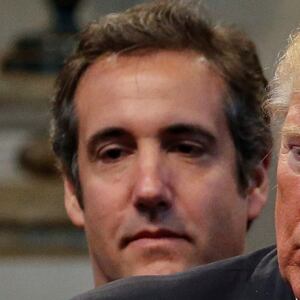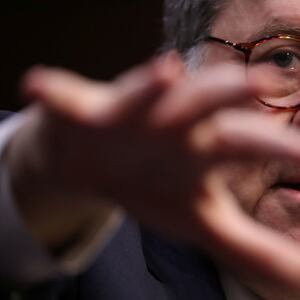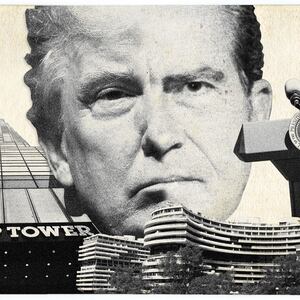The BuzzFeed report Thursday evening that President Donald Trump directed his attorney Michael Cohen to lie to Congress about negotiations to build a Trump Tower in Russia may be a turning point in the Russia investigation.
Friday evening, after this story was first posted, Mueller's office put out a rare public statement:
If the core allegation of the BuzzFeed story does hold up, however, it could amount to subornation of perjury, witness tampering, and obstruction of justice. Not only would Trump’s conduct violate the criminal code, but it would likely also amount to the kind of high crime or misdemeanor for which impeachment is appropriate. After all, obstruction of justice for covering up the Watergate break-in was the basis for the first article of impeachment filed against President Richard Nixon. Several reasons make this report particularly significant.
ADVERTISEMENT
First, the BuzzFeed report, which Mueller is now contesting, states that the special counsel has more evidence of this conduct than merely the word of Cohen, an admitted liar whose credibility can reasonably be questioned. Trump attorney Rudy Giuliani has responded to the report by saying that “If you believe Cohen, I can get you a great deal on the Brooklyn Bridge.” But if the BuzzFeed report is right, outside of its characterization, that finders of fact need not rely on the credibility of Cohen but the accounts of “multiple witnesses” as well as corroborating evidence in the form of text messages, emails and “a cache of documents.” Even if a fact finder is not inclined to believe Cohen, other witnesses are telling the same story. And even if these witnesses should turn out to have credibility challenges of their own, multiple documents corroborate their testimony. It is often said that documents don’t lie.
Second, the allegation meets even the narrow legal definition of obstruction of justice that has been offered by William Barr, Trump’s nominee for attorney general. Last June, Barr sent an unsolicited memo to Department of Justice leadership regarding the special counsel’s investigation, arguing that he believed that Robert Mueller was pursuing a theory of obstruction of justice that was “fatally misconceived.” In the memo, Barr argued that a president cannot legally obstruct justice when he takes “facially-lawful actions” in “exercising the discretion vested in him by the Constitution.” For example, Barr would argue that a president cannot obstruct justice by asking then-FBI Director James Comey to “let go” of the investigation into former National Security Advisor Michael Flynn or by firing Comey as FBI director. As chief executive, Barr’s thinking goes, the president is permitted to direct his subordinates to investigate or stop investigating certain matters.
Not everyone agrees with Barr’s view of executive power. For example, I disagree that a president can never obstruct justice when he is engaging in a facially lawful action, such if he were to fire an appointee in exchange for a bribe. But even Barr agrees that a president can obstruct justice in the scenario that has been reported. As Barr’s memo states: “Obviously, the President and any other official can commit obstruction in this classic sense of sabotaging a proceeding’s truth-finding function. Thus, for example, if a President knowingly destroys or alters evidence, suborns perjury, or induces a witness to change testimony, or commits any act deliberately impairing the integrity or availability of evidence, then he, like anyone else, commits the crime of obstruction.” This brand of obstruction—sabotaging a proceeding’s truth-finding function by suborning perjury—is the type of obstruction that the new report alleges. If Trump directed Cohen to lie to Congress, this would be an act of obstruction of justice even under Barr’s narrow definition.
Third, if this report is true, it raises a deeper substantive question. Lying is always a red flag for prosecutors because it begs the question of why. Why would someone risk the negative consequences of being caught in a lie? The answer is usually that the person has an even greater fear of the consequences of the truth. A lie may even indicate consciousness of guilt, that is, the person knows that his actual conduct was illegal, and so he needs to lie about it to protect himself from criminal exposure. Here, the lie appears to have been designed to conceal the fact that negotiations with Russia regarding a Trump Tower in Moscow lasted into June 2016. What is it about that fact that would cause Trump and Cohen to risk the serious consequences of perjury? The answer is not yet known, but whatever the answer is, it was so bad that Trump and Cohen were willing to violate the law by lying to conceal it.
One final fact that makes this report significant is its sourcing. (Again, this is what Mueller's office now seems to be contesting.) The report is attributed to “two federal law enforcement officials involved in an investigation of the matter,” not “people familiar with the investigation,” which often means witnesses or their lawyers. Federal law enforcement officials involved in the investigation are more likely to be accurate about the report than mere witnesses, and the fact that there are not one but two of them tends to enhance the credibility of the allegations. On the other hand, this leak also seems to be an egregious breach of an official’s duties to maintain the confidentiality of an ongoing investigation. It is difficult to imagine a legitimate reason for law enforcement officials involved in the investigation to leak this news to the press. It does not help Mueller’s investigation, and may even harm it by tipping off witnesses or suspects about this area of inquiry. Tipping off witnesses or suspects permits them to alter documents, tamper with witnesses, and get their stories straight.
The timing of the disclosure on the heels of Barr’s confirmation hearing also raises the question as to whether there is some political motive behind the disclosure. During the hearings, Barr would not commit to disclosing Mueller’s final report to the public. Perhaps the motive of these federal law enforcement officials in leaking was to put the issue into the public arena so that it can be addressed by Congress even if Mueller’s report does not see the light of day.
The allegations that Trump directed Cohen to lie to Congress are very serious. If true, it is hard to imagine that Congress could overlook them. Standing alone, the allegations raise an impeachable offense. The truth they are intended to conceal could be even worse.









